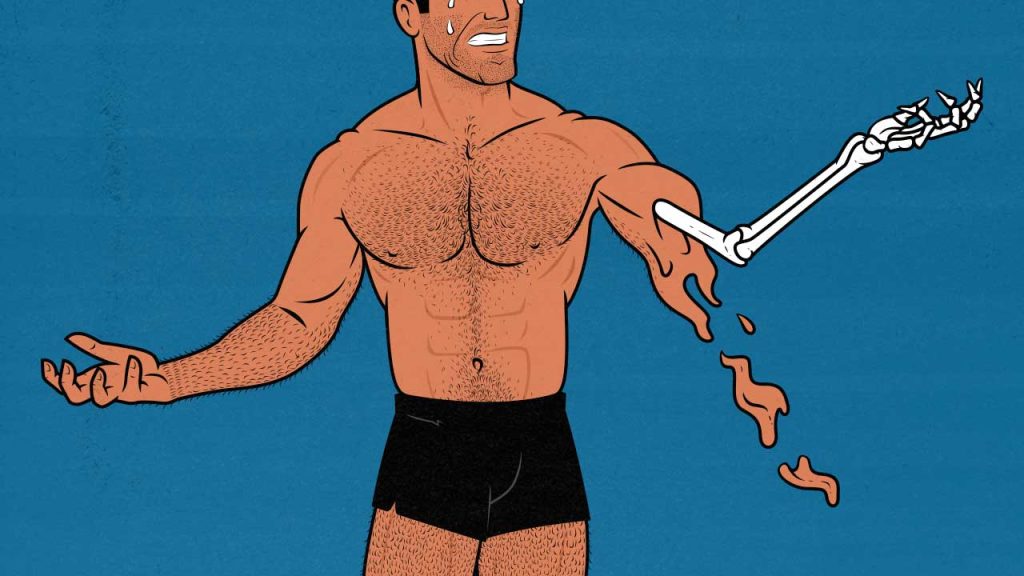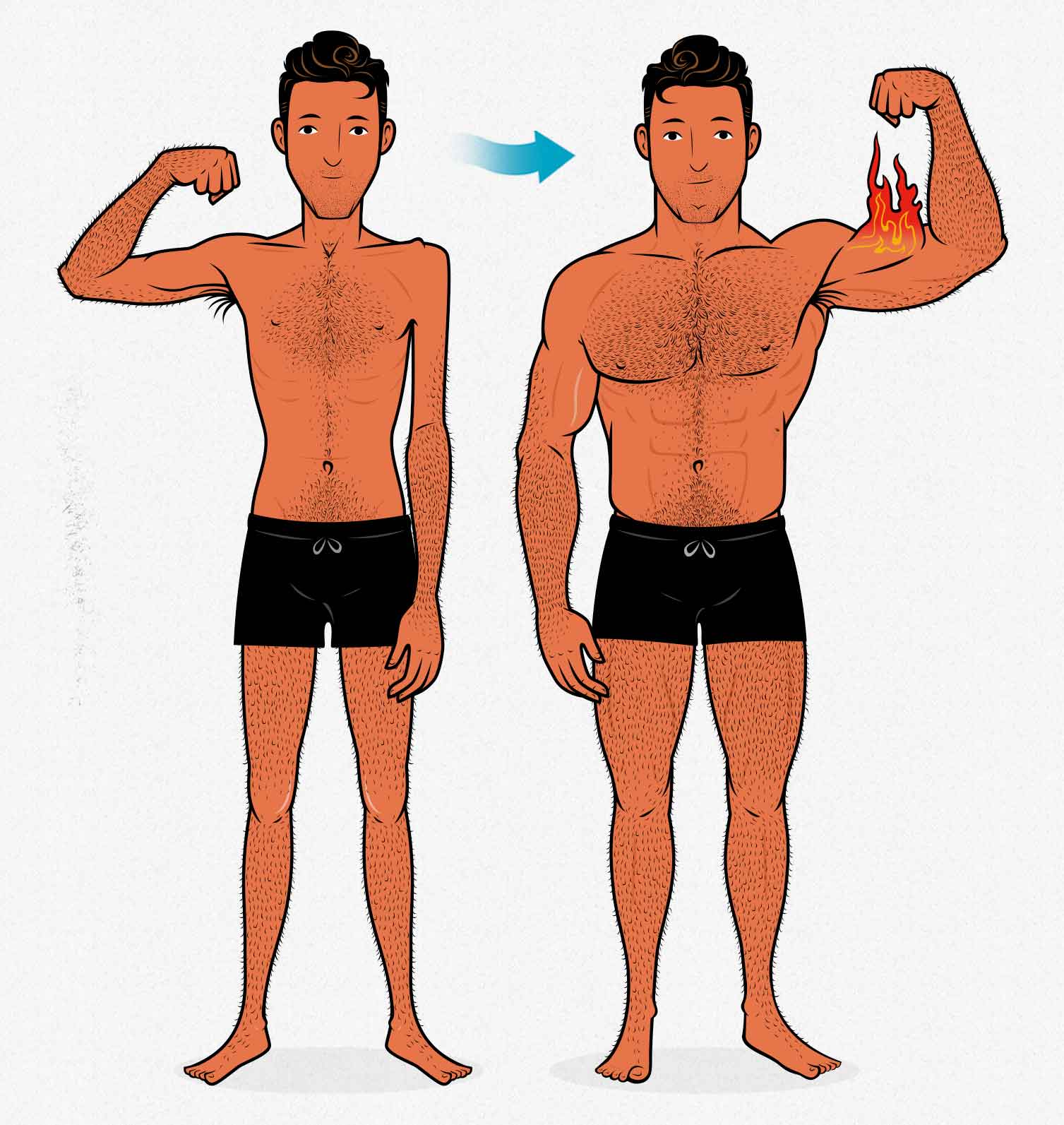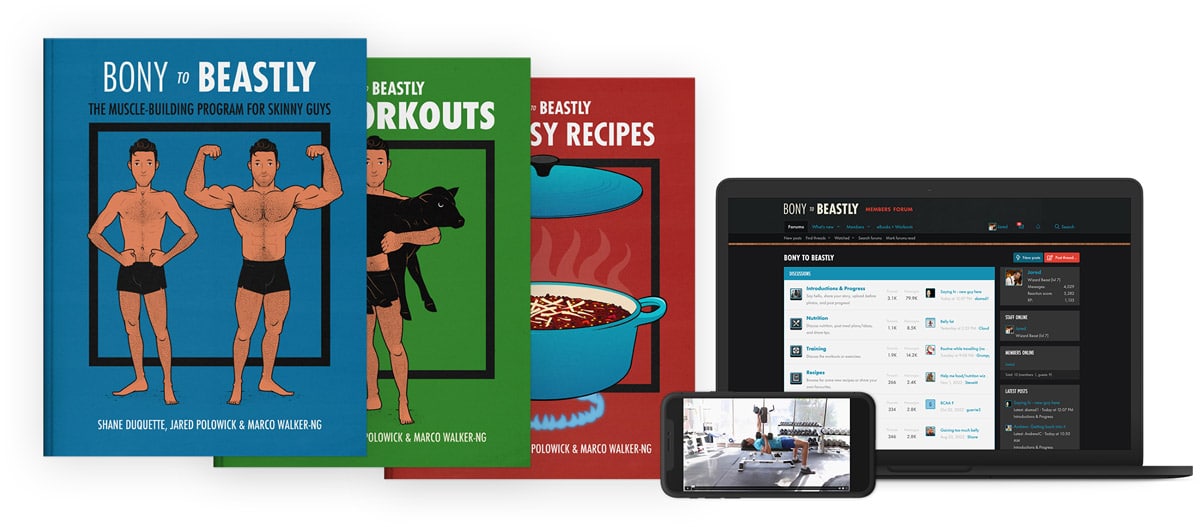
What Happens if You Don’t Eat Enough Protein While Bulking?
Your muscles aren’t made of just protein. They’re actually around 76% water (study). That isn’t to say protein isn’t important. It is. It’s just that since only a small portion of your muscles are made of protein, you actually don’t need to eat that much extra protein to maximize your rate of muscle growth.
The bottleneck for muscle growth is often energy—calories—not your protein intake. If you’re fairly lean or skinny, the best thing you can do to build muscle faster is to stimulate more growth in the gym and then eat more food.
In fact, if you aren’t eating enough calories to gain weight, you may not be able to gain any muscle at all. It can completely halt your muscle growth. If you’re lifting weights and gaining weight, though, you should be able to build muscle just fine, even if you aren’t optimizing your protein intake.
With all of that said, the contractile tissue in your muscles is made of protein. Protein does matter. Plus, you also need protein for the rest of your organs, your hair, nails, and all manner of bodily functions. Eating enough protein is part of eating a balanced diet, and hitting your minimum protein targets will indeed allow you to build muscle faster.
But how much does protein help? And what happens if you don’t eat enough?

Video Version of the Article
If you prefer watching to reading, we’ve started making videos for some of our articles, including this one. It covers all of the same points. Check it out:
If you prefer to read, read on!
How Much Protein Should You Eat?
Most research shows that you can maximize your rate of muscle growth with around 0.7 grams of protein per pound bodyweight per day (1.6g/kg/day). For someone who weighs 130 pounds, that means eating at least 91 grams of protein per day. If you’re eating a lot of calories, you’re eating balanced meals, and you’re eating a few meals every day, your protein intake will add up fast. You may find yourself hitting that protein target without even trying. But what if you don’t?
What If You Don’t Eat Enough?
First, I asked Dr. Stuart Phillips, one of the authors of the meta-analysis these protein recommendations come from. He told me:
Most adaptations occur with 1.6g/kg/day (or less). I think if someone is consuming less [protein], it would have a trivial effect on their gains, especially beginners who appear to derive no real benefit from protein supplementation anyway.
Protein is still important, but (based on data), far less important than just getting enough energy to gain. The machine needs fuel, and protein’s not a bad choice!
Stuart Phillips, Ph.D.
I was curious about exactly how trivial the losses in muscle growth might be, as well as how a lower rate of muscle growth would affect the rate at which you should gain weight. So I asked, Dr. Eric Trexler, another muscle growth researcher (and research reviewer). He told me:
I suspect that someone who’s regularly eating 1.2-1.4g/kg would make at least 80% of the gains of someone regularly consuming over 1.6g/kg in a given time frame, but that’s a complete hunch, and will vary from context to context.
Eric Trexler, Ph.D.
The Case for Bulking on Lower-Protein Diets
Eric Trexler also pointed out that some people may have an easier time building muscle if they undershoot their protein goals. Protein is quite filling, so eating less of it might make it easier to eat enough calories, which is a much more important factor. And protein is also quite expensive. Eating less of it might be more affordable.
People eating plant-based diets may find it easier to aim for lower protein targets, too, though it’s worth noting that at lower protein intakes, eating a balanced mix of amino acids becomes more important. If all of your protein is plant-based, it might be a little bit more important to hit that minimum target of around 0.7g/lb/day. If you’re doing that, though, plant-based diets can be great for building muscle. No worries there.
Should You Bulk Slower If You Eat Less Protein?
Eric Trexler also confirmed my own hunch: your rate of weight gain should be proportional to your expected rate of muscle gain. So if you’re gaining muscle more slowly, you should gain weight more slowly, too. If eating too little protein causes a 20% reduction in muscle growth, you should slow your rate of weight gain by 20% as well. If you’re a skinny beginner, maybe that means gaining 0.4–0.8 pounds per week instead of 0.5–1 pound per week while bulking.
Hypertrophy Training Is a Massive Growth Stimulus
Finally, it’s important to remember that your workouts are what stimulate muscle growth. The more powerful you can make that stimulus, the faster you’ll build muscle. If you combine a good hypertrophy training workout program with enough calories, you can build muscle quite quickly, even if you aren’t eating quite enough protein. And if your workout program is iffy, fixing it is much more important than optimizing your protein intake.
Summary
If you don’t eat enough protein while bulking as a beginner, it won’t have much impact on your results. As an intermediate lifter, it might reduce your muscle growth by around 20%, depending on how little protein you’re eating.
To stimulate muscle growth, you should lift weights. More specifically, you should follow a hypertrophy training program. Then, to build muscle, you need to eat enough food. The most important part of that bulking diet is eating enough calories to gain weight. However, it’s true that you’ll build muscle faster if you eat at least 0.7 grams of protein per pound bodyweight per day (1.6g/kg/day).
If you aren’t eating enough protein, you should slow your rate of weight gain to account for a slightly slower rate of muscle growth. For example, if you’re eating 20% less protein than is recommended, slow your rate of weight gain by 20%.

Anyway, if you want more muscle-building information, we have a free bulking newsletter for skinny guys. If you want a full foundational bulking program, including a 5-month full-body workout routine, diet guide, recipe book, and online coaching, check out our Bony to Beastly Bulking Program. Or, if you want a customizable intermediate bulking program, check out our Outlift Program.

